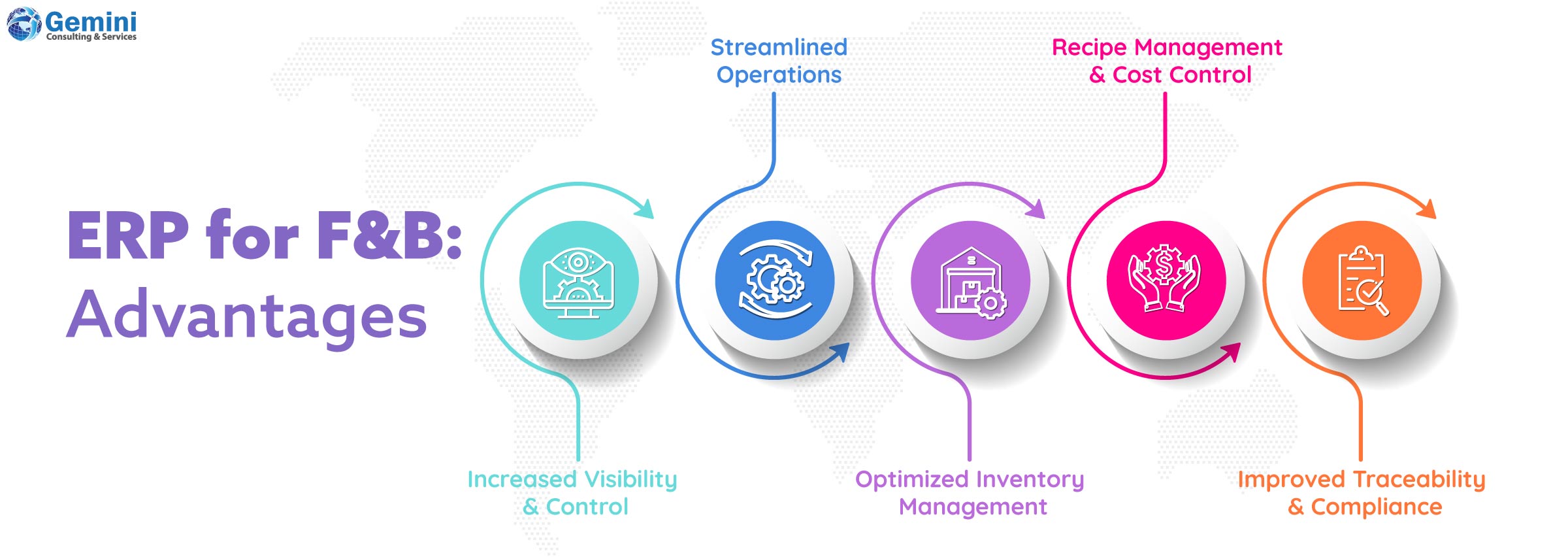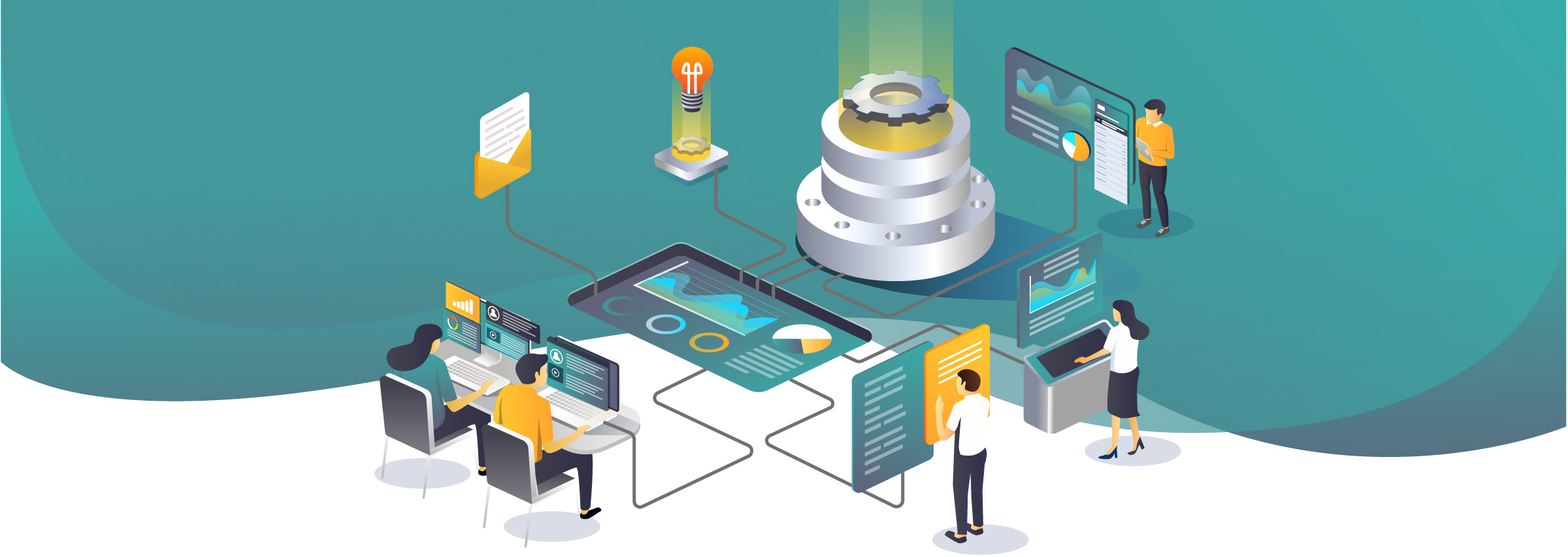The Food and Beverage (F&B) sector presents numerous promising opportunities, yet behind the scenes, managing operations can quickly become a daunting challenge. Frequent changes in regulations, inefficient procedures, and fragmented data can turn your culinary vision into a complex problem. In such scenarios, an Enterprise Resource Planning (ERP) system tailored for the food and beverage industry can be a game-changer.
An ERP system designed for this industry offers a comprehensive solution to integrate various business functions. It serves as a unified platform that handles everything from sourcing raw materials to managing products, transactions, and finances.
F&B Industry: Transform Operations with ERP

To remain competitive in the rapidly changing food and beverage industry, efficiency is essential. ERP software equips companies with powerful tools to align their operations and secure a substantial competitive edge.
Increased Visibility and Control
An Enterprise Resource Planning (ERP) system provides a centralized platform for accessing inventory levels, production plans, and sales performance. This consolidated view enables businesses to make data-driven decisions, allocate resources efficiently, and set the stage for future growth.
Streamlined Operations
ERP systems free up resources by automating processes and remove information silos. By integrating departments such as warehousing and procurement, ERP systems reduce errors and enhance efficiency, leading to greater productivity.
Optimized Inventory Management
It can be challenging for the food and beverage industry to manage their inventory due to compliance requirements, perishability of the products, and demand fluctuations. An ERP system aids in managing inventory more efficiently, reducing waste, and ensuring compliance with food safety standards.
Recipe Management and Cost Control
Consistency and cost management are key to maintaining quality and profitability. ERP systems streamline recipe management, track ingredient usage, and calculate production costs, helping to identify cost-saving opportunities and refine pricing strategies.
Improved Traceability and Compliance
ERP systems facilitate the monitoring of materials from their source to the final product as food safety is the prime consideration of the F&B industry. The system help ensure compliance with regulations and enabling swift recalls if needed.
Key Features of an ERP System
Shelf-Life Management
ERP solutions help enterprises to efficiently manage shelf life of products. This in turn reduces wastage. They can issue alerts for product expiration, aiding in optimal stock rotation.
Compliance Management
ERP systems streamline the management of documentation, compliance audits, and reporting, ensuring adherence to industry standards and keeping up with evolving food safety regulations.
Quality Control Management
F&B enterprises can effectively manage quality control and maintain product consistency with ERP systems. They track inspections, manage non-conformance reports, and identify areas for improvement.
Supplier Relationship Management
ERP systems improve supplier relationships by overseeing contracts, monitoring orders, and enhancing supplier performance.
Demand Forecasting and Production Planning
By analyzing historical sales data and market trends, ERP systems enable analysis of e historical sales data and marketing trends. These data make it possible to forecast demand more accurate thereby, helping enterprises to plan production efficiently and meet market demands.
Evaluating ERP Costs for the Food and Beverage Industry
The cost of implementing an ERP system can be a significant factor in deciding whether to adopt such a solution for food and beverage businesses. The implementation cost of an ERP system is mainly determined by the size of the business and the complexity of its operations. Given below are some of the cost considerations.
Software Licensing and Implementation
The costs of implementing ERP systems differ. The pricing can either depend on the number of users or the features in the system. Additionally, implementing an ERP system involves professional services for tasks such as system setup, data migration, and employee training. Therefore, it's important to weigh both the financial and expertise-related aspects when making your decision.

Strategies for Managing ERP Costs
Identify Specific Needs
Businesses need to focus on implementing an ERP system that aligns with the business requirements of the food and beverage industry. They should ensure that it matches with their business size. Avoid being tempted by features that aren’t relevant to your operations.
Explore Cloud-Based Solutions
Cloud-based ERP solutions often eliminate the need for substantial investments in hardware and IT infrastructure, making them a cost-effective option for many companies. Be sure to obtain and compare quotes from various vendors to find a cost-effective ERP solution.
Selecting the Ideal ERP System for Your Food and Beverage Business
ERP systems from Gemini Consulting & Services stand out as a well-crafted solution designed to support your business growth and enhance profitability. Our ERP is a prime example of a system that offers valuable industry-specific features and scalability. Contact us to design a customized ERP system for your F&B enterprise so that you can improve the efficiency of your business.
Industry Expertise and Scalability
F&B companies should be careful in selecting an ERP provider who has extensive experience and a thorough understanding of the sector’s specific challenges and compliance requirements. The chosen system should be capable of evolving with your business, accommodating future growth and changes. Triggered by innovation and the need for operational efficiency, the food and beverage industry recorded major growth in the past 10 years. This growth was driven by innovation and the need for operational efficiency. An ERP system customized for this industry can be a key asset in navigating complexities and achieving long-term success. By implementing the right ERP solution, you ensure that your business remains competitive and successful for years to come.



